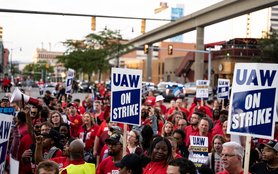Last week, the child care crisis in the U.S. fell off a cliff, as pandemic-era funding expired. As Congress fails to act, it hurts not just families, but countless child care professionals who are already struggling to get by. Here, one expert tells her story.
Earlier this fall, as teachers and children returned to the classroom, families across the country traded the summer camp shuffle for school pickups and drop-offs. But countless Americans are still faced with the same urgent question all year long: How can they access and afford reliable child care?
For many working families in the U.S., the answer is becoming more challenging than ever as child care costs continue to skyrocket and outpace wages by a landslide.
But America’s child care crisis doesn’t only impact parents and their children. We must consider the other crucial part of this equation: the early childhood educators who dedicate their lives to the care and education of our nation’s children, often with scant reward or recognition.
I love my job as an early childhood educator more than anything. After working as a federal government contractor for over 20 years, I switched to the child care sector and founded Kings & Queens Child Care Center— “where every child is royalty”—because I wanted to make a real difference in the lives of DC families. As the Executive Director of the DC Family Child Care Association, I’m also working to ensure that DC family child care teachers’ voices are heard and recognized. I love what I do, and I love the families I serve.
But we cannot work on love alone.
We are struggling all over this country. In my community family child care, many early childhood educators are like me: over 50 and relying on their retirement savings from previous careers to support their current work.
Women, particularly women of color, are drastically overrepresented in the field, and most available jobs pay dismally low wages and offer few benefits or protections – and our government does little to nothing to fill these gaps. The U.S. actually earned a failing grade (43 out of 100) on the Care Policy Scorecard released by Oxfam America earlier this month, reflecting the sheer lack of support for both unpaid and paid care workers.
As a Black woman, my job as a child care educator is especially fraught. Black enslaved women were the original child care providers, forced to rear the children of other families for no pay or recognition. It’s impossible to decouple the history of chattel slavery from the state of the child care industry today, and it’s no coincidence the sector still underpays and undervalues its workers, who are still disproportionately Black women and women of color.
Those working to educate and care for our nation’s children should not make poverty wages. Care work is not “help work” or “babysitting;” it’s the cornerstone of our economy and society. As the costs of living continue to rise and the federal minimum wage remains stagnant, careers in the child care sector are becoming increasingly unsustainable, and child care worker shortages will only make it harder for families to find and afford child care.
Our current systems are not working for anyone—not the early childhood educators themselves or the families that rely on their services.
Child care is one of the most widely used forms of care work and deserves to be valued. We desperately need legislative action at both federal and state levels to ensure pay equity for child care workers and sufficient funding for quality education and community programs.
There have already been some successful efforts to address these challenges. In DC, for example, early childhood educators working in home-based and center programs received significant wage increases thanks to a local income tax on the wealthiest DC residents.
During the pandemic, federal funds from the American Rescue Plan Act helped child care programs keep their doors open. However, this funding expired on September 30th, and the child care crisis will only worsen if federal lawmakers do not act quickly to provide emergency relief to the sector.
We need decisive, permanent federal action to make child care accessible for all American families and ensure child care workers are paid a fair living wage.
__________________________________
Oxfam endorses efforts to address the child care cliff, including the passage of the Child Care Stabilization Act, which would provide $16 billion in child care stabilization over five years. This act would be a critical step toward ensuring that we’re not making it even harder for people to access and provide child care in America.



